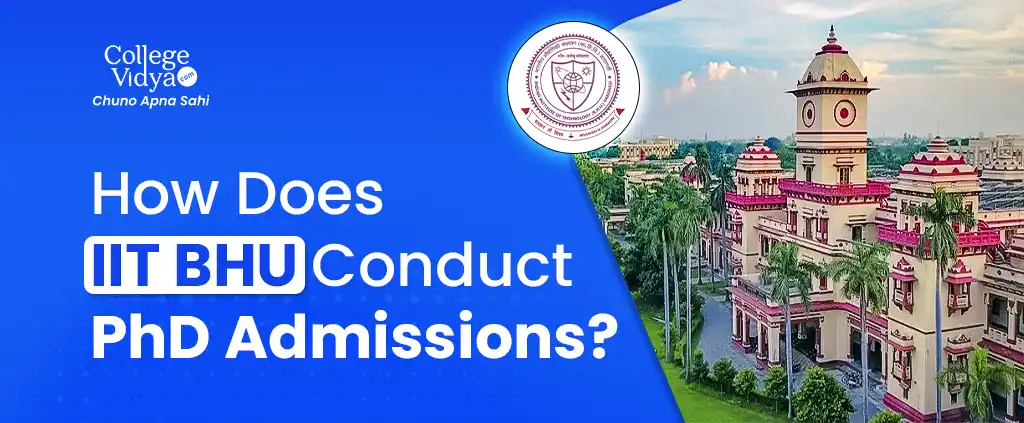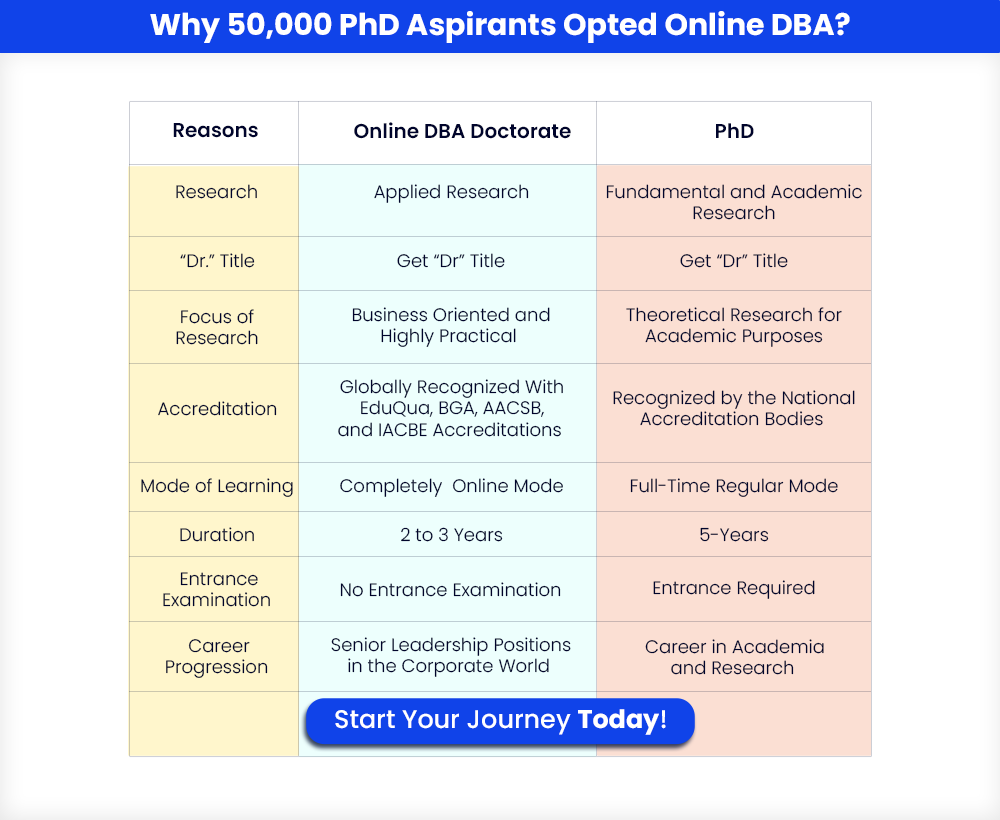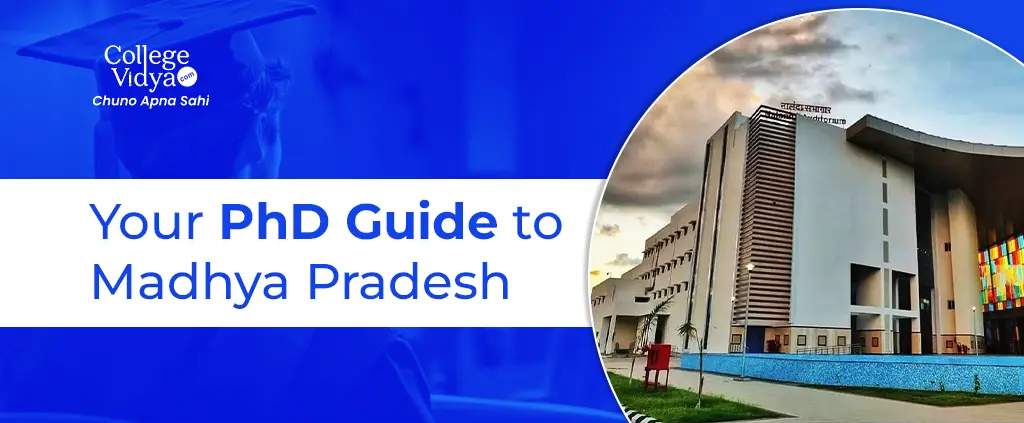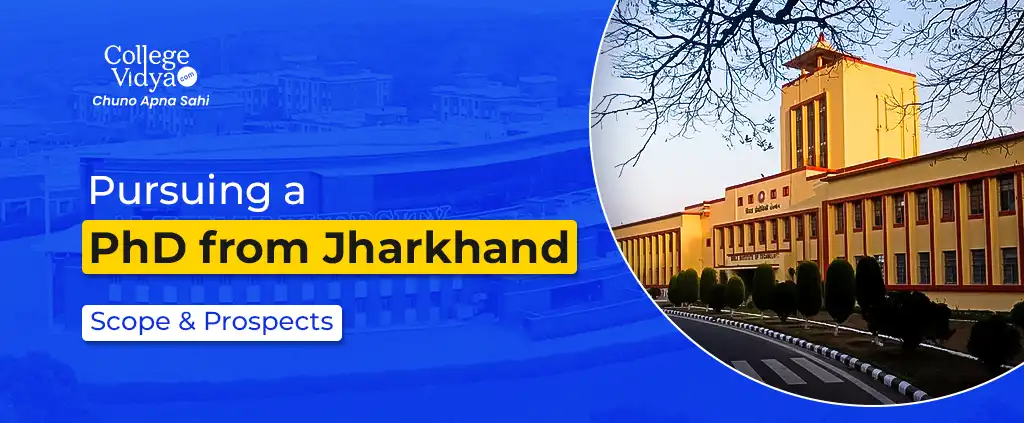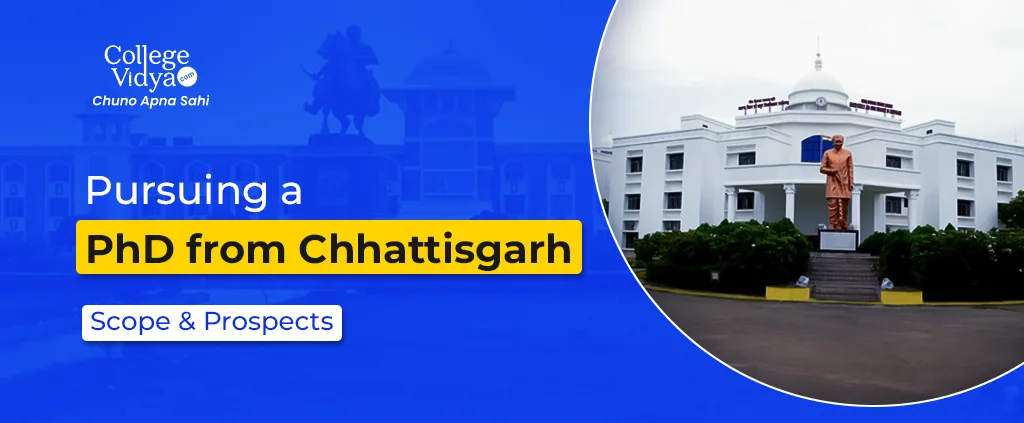If you are searching for an institution that offers an opportunity to conduct high-quality research, the Indian Institute of Technology, BHU(IIT BHU) can be a good choice. You will get prospects for conducting research that will not only enhance your knowledge and expertise. The PhD programs at IIT BHU offer theoretical and experimental research in a wide range of academic disciplines. You get the opportunity to conduct research in areas such as engineering, sciences, management, humanities, and social sciences. The PhD program at IIT BHU promotes independent thinking and initiative toward producing high-quality research. If you want to make a substantive contribution in your field with independent research, admission to the IIT BHU must be at the top of your priority list.
If you are a working professional who is looking for career growth through a doctorate, an Online Doctorate of Business Administration offers a perfect pathway.
The program is highly flexible and accessible with a focus on business-oriented research. You can pursue this program without quitting your current job. The program can be completed within 36 months and you can prefix your name with the “Dr” title post-post-completion.
|
In-Demand Doctorate Programs for Working Professionals |
|
Why consider IIT BHU for the PhD Admissions
One does not require a reason to get admission to the IIT BHU PhD programs. The prestige and popularity of this institute in India and worldwide for high-quality education is itself the biggest reason. The academic program offered by IIT BHU provides excellent knowledge and expertise, especially a doctoral degree. It is renowned for its focus on research because of the opportunities it offers to the PhD scholars.
PhD scholars at IIT BHU get cutting-edge research opportunities to conduct independent research in their selected domain. PhD research at IIT BHU is ranked among the top 10 in the engineering category and top 30 in the overall category by the National Assessment and Accreditation Council(NAAC). This ranking is enough for considering IIT BHU for PhD admission. Here are a few more reasons why one should consider IIT BHU for a PhD admission-
- IIT BHU offers state-of-the-art facilities for conducting high-quality research.
- IIT BHU provides advanced opportunities for conducting research that can contribute to the knowledge enhancement of the original field.
- PhD research at IIT BHU is supervised by extremely experienced and highly qualified faculty members who have completed their PhD degrees from the most reputed universities across the world.
- IIT BHU encourages PhD scholars to conduct interdisciplinary research by coordinating with other departments.
- The PhD focuses on theoretical and practical research.
IIT BHU PhD Admission Overview
The PhD admissions at IIT BHU are conducted twice a year. Generally, the admission for PhD is entertained in January and July. The admission sessions are also named after these months which are the January session and the July session. The admission process for these sessions normally starts before 2-3 months. IIT BHU notifies the schedules for the application start date, the last date for application, the test date, and the admission date in advance. Candidates interested in this program at IIT BHU can follow the schedule to begin their admission process.
Admission to a PhD program at IIT BHU program held in two main phases. The admissions are conducted through written tests and personal interviews. Candidates qualifying for the written test are only processed for the personal interview. Here is a detailed overview of the IIT BHU admission-
|
Admissions To IIT BHU PhD Programs 2025-26 |
|
|
University |
Indian Institute of Technology, BHU |
|
Course Name |
Doctor of Philosophy (PhD) |
|
Admission Sessions |
January Session and July Session |
|
Upcoming Admission Session |
July Session |
|
Academic Disciplines |
Engineering, Management, Sciences, Humanities and Social Sciences. |
|
Selection Process |
Written Test and Interview |
|
Academic Session |
2025-2026 |
|
Mode of Application |
Online |
|
Application Fees |
GN/EWS/OBC-NCL (Male/Transgender candidates): Rs.1000/- GN/EWS/OBC-NCL Female candidates/ SC/ST/PWD: Rs.500/- |
|
Official Website |
|
Given the admission requirements and admission process, getting admission to the PhD program at IIT BHU is highly challenging. The written examinations are very difficult to crack which requires foremost preparation. Working professionals who are looking for career growth may not be able to qualify for these examinations. However, they can still get their doctoral degree from international universities by enrolling in an Online DBA Doctorate. The program is highly flexible with a simple admission process. This is an online doctoral degree degree designed exclusively for experienced professionals who want to navigate their careers in leadership roles. This online doctorate can be completed within 36 months and offers a well-respected “Dr” title.
|
Working Professionals Also Search For |
|
IIT BHU Discipline-wise Research Areas
|
Disciplines |
Research Areas |
|
Ceramic Engineering |
Bio-Ceramics, Ceramic/Metal/Polymer matrix composites, Electro Ceramics, Glass and Glass Ceramics, Refractories, Advanced Ceramics, Nano Technology, Cement & Concrete Technology, and Energy Materials. |
|
Chemical Engineering |
To be announced at the time of the Interview |
|
Civil Engineering |
Structural Engineering; Hydraulics and Water Resources Engineering; Environmental Engineering; Geotechnical Engineering; Transportation Engineering; Geo-informatics; Geology. |
|
Computer Science & Engineering |
Social Network Analysis, HPC, Machine Vision, Natural Language Processing, Information Extraction, Data Mining, Image Processing, and Pattern Recognition. |
|
Electrical Engineering |
Electrical machines & Drives; Power Electronics; Control Systems; Power Systems |
|
Systems Engineering |
Systems Engineering |
|
Electronics Engineering |
Microwave Engineering; Digital Techniques and Instrumentation; Microelectronics, Communication System Engineering |
|
Humanities and Social Sciences |
Computational Linguistics, Natural Language Processing, Machine Translation, Indian Knowledge System, Environmental Studies including Sanitation & Human Health, Waste Management, Slums, Applied Geography, Cultural Studies, Literary Theory, English Literature, Professional Communication, Physical-Education Sports, and Applied Areas, Sociology and Social Anthropology in India, Group Dynamics, Well Being, Leadership, Refugee Identity, Cognitive Semantics, Comparative Grammar, Linguistic Landscape Study, Sociolinguistics, Applied Linguistics, Lexicography, Computation Linguistics, Semantics, Historical Anthropology of India, Semantics, Epistemology, Colonial India, Memory, Death Studies, Health Humanities, Life Writing, Film Studies, Cultural Studies. |
|
Mechanical Engineering |
|
|
Industrial Management |
Operations Management, SCM, Production System |
|
Metallurgical Engineering |
Microstructural, Structural, and Chemical Characterization; Mechanical Behavior, Deformation Processing, and Failure Analysis; Phase Equilibria and Phase Transformation; Non-Equilibrium Processing of Advanced Materials; Ultra-Fine Grained and Nano-Structured Material; Metallurgical and E-Waste Utilization; Design and Development of Advanced Steels; Tribology and Surface Engineering’ Thermodynamics and Kinetics of Metallurgical Processes’ Advanced Structural and Functional Materials. |
|
Mining Engineering |
To be announced at the time of the Interview |
|
Pharmacy |
Pharmaceutics, Pharmaceutical Chemistry, Pharmacology, Pharmacognosy. |
|
Physics |
Solar & Space Plasma Physics, Condensed Matter Physics (Theory), Quantum Information, Condensed Matter Physics (Experiment) & Materials Science (Experiment), Biophysics, Photonics (Theory and Experiment), Remote Sensing, High Energy Physics, Nuclear Physics, Cosmology. |
|
Chemistry |
Synthetic Chemistry, Environmental Chemistry, Surface Chemistry, Computational Chemistry |
|
Mathematical Sciences |
Pseudo-differential operators/Wavelets Analysis/Functional Analysis, Partial Differential Equations, Differential Equation/Image Processing, Probability, Stochastic Process, Optimization Techniques (a student who knows real analysis), Graphs Theory and Network Sciences, Spectral Geometry, Differential Geometry, Analysis of Manifolds, Analysis of Partial Differential Equation, Functional Analysis, Measure Theory, Applied Probability, Stochastic Process, Statistics, Computational Fluid Dynamics, Hydrodynamic Stability. |
|
Biochemical Engineering |
All areas of Biochemical Engineering. |
|
Biomedical Engineering |
Physiology; Electrophysiology & Neuro Biology; Polymer in Medicine; Bioinstrumentation, Biomedical Signal & Image Processing; Modeling of Biological Systems, Biological Control System Analysis; Biomechanics; Tissue Engineering & Microfluidics; Molecular Biology, Biochemistry, Biotechnology & Nano Medicine; Optical Nanomaterial, Biosending, Image Theranostics. (1) Artificial Intelligence and its application to Biomedical Signal & Image Processing. (2) Bioinstrumentation. (3) Brain-Computer Interface (4) Rehabilitation Engineering. (5) Computational Neuroscience. (6) Neuroinformatics. (7) Biomedical Signal Processing. |
|
Materials Science & Technology |
M.Sc./B.Tech./M.Tech. Degree in Materials Science/Physics/Chemistry/Polymer Science/ Materials Science & Technology/ Polymer Engineering & Technology/Nanoscience and Nanotechnology/Biotechnology. |
Eligibility Criteria for PhD Admissions at IIT BHU
Candidates willing to pursue their PhD degree from the Indian Institute of Technology, BHU(IIT BHU) have to meet certain eligibility criteria of the institute. The eligibility requirements for PhD admissions for IIT BHU PhD admissions are as follows-
Full-Time Regular Registration Category
- Master’s degree in the relevant subject/allied discipline from a recognized university with 60% marks or 6.0 CPI (on a 10.0 point scale).
OR
- 4-year bachelor’s degree in the relevant subject/allied discipline from a recognized university with a minimum of 75% marks or 7.5 CGPA on a 10-point scale.
- Students who have qualified for national-level scholarships such as UGC-NET JRF, CSIR-NET JRF, Indian Council of Medical Research or DST-INSPIRE fellowship, or Dr. K.S. Krishnan Fellowship of DAE are exempted from written tests. However, they need to appear for a personal interview.
Departments, Discipline, and Allied Discipline for PhD at IIT BHU
Some degrees do not directly corroborate the particular discipline. However, candidates posing them can be considered for PhD admission in a particular department. Here is the list of such degrees that act as an allied discipline for a PhD admission at IIT BHU-
|
Departments |
Discipline |
Allied Disciplines |
|
Department of Architecture, Planning and Design |
Architecture, Planning, and Design |
B.Tech.(Civil) with M.Tech. (Civil or Equivalent). |
|
Department of Ceramic Engineering |
Ceramic Engineering |
|
|
Department of Chemical Engineering & Technology |
Chemical Engineering |
|
|
Department of Civil Engineering |
Civil Engineering |
Environmental Engineering
Geotechnical Engineering
Structural Engineering
Hydraulic and Water Resources Engineering
Transportation Engineering
Geoinformatics
Geo-Science
|
|
Department of Computer Science & Engineering |
Computer Science & Engineering |
B.Tech./B.E./M.Tech./M.E. degree in Computer Technology/Information Technology/ Electronics and Communication Engineering/ Data Science and Artificial Intelligence (DA)/All related subjects of Computer Engineering at M.Tech. level/ M.Tech. in Mathematics and Computing. |
|
Department of Electrical Engineering |
Electrical Engineering |
B.Tech. & M.Tech. in Electronics Engineering. |
|
Systems Engineering |
Bachelor’s and Master’s Degree in any Branch of Engineering or Bachelor’s Degree in any Branch of Engineering. |
|
|
Department of Electronics Engineering |
Electronics Engineering |
Master’s degree in any of the following areas: Digital Communication Systems, Information and Coding Theory, Telecom Networks, Mobile and Wireless Communication Systems, Digital Systems and Microprocessors, Digital Signal and Image Processing, Computer Vision and Robotics, Signal and Systems Theory, Control Systems, Fuzzy Logic, Neural Networks and their applications, Power Electronics, Microelectronics and VLSI Systems, Semiconductor Device Modelling and Simulation, Solid State Devices, Organic Electronics, Transparent Semi-conductors and Photovoltaics, Sensors and Pattern Recognition, Electronic Instrumentation and Virtual Instrumentation, Electromagnetics, RF Engineering and Microwaves, Antennas, Optoelectronics and Optical Communication, Photonic Networks and Systems, Information Technology. |
|
Department of Humanistic Studies |
Humanities and Social Sciences |
Master’s/Bachelor’s degree in any Engineering discipline; Master’s degree in any Science discipline; 4-year – Bachelor’s Science degree. |
|
Department of Mechanical Engineering |
Mechanical Engineering |
M.Sc./M.S. in Physical Sciences with a background appropriate to Thermal & Fluid / Machine Design/Production. OR Bachelor’s/Master’s degree in any branch of Engineering related to the Thermal & Fluid/Machine Design/ Production and Manufacturing area. |
|
Industrial Management |
Bachelor’s degree in any branch of Engineering and Master’s degree in any branch of Engineering/ Management. OR Bachelor’s degree in any discipline and MBA in Operations Management, Business Analytics, or Finance of related allied discipline with valid NET-JRF or any national-level scholarship. OR Bachelor’s degree in any discipline and Master’s degree in Computer Science, Mathematics, Statistics, Decision Sciences, Ergonomics or human factors with valid NET-JRF or any national-level scholarship. |
|
|
Department of Metallurgical Engineering |
Metallurgical Engineering |
|
|
Department of Mining Engineering |
Mining Engineering |
|
|
Department of Pharmaceutical Engineering and Technology |
Pharmacy |
MS/M.Pharm./M.Tech. in Pharmacy/Pharmaceutical Sciences/ Pharmaceutical Engg./Pharmaceutical Technology/ Pharmaceutical Biotechnology/ Bioinformatics/ Biochemical Engineering/ Biomedical Engg. with graduation in Pharmacy (B.Pharm./B.Tech.). |
|
Department of Physics |
Physics |
M.Sc./M.Tech. in Applied Physics, Engineering Physics, BioPhysics, Electronics Engg., Materials Science, Ceramic Engg., Metallurgical Engg., Electrical Engg., Bio-Informatics, Geomatics and Geoinformatics, Computer Science, Computer Engg., Mechanical Engg., Mathematics, Chemistry, Remote Sensing, Astrophysics, Space Physics, Applied Optics, Atmospheric Physics, Fibre Optics & Photonics, Nanotechnology and Biotechnology. |
|
Department of Chemistry |
Chemistry |
|
|
Department of Mathematical Sciences |
Mathematical Sciences |
|
|
School of Biochemical Engineering |
Biochemical Engineering |
|
|
School of Biomedical Engineering |
Biomedical Engineering |
|
|
School of Materials Science & Technology |
Materials Science &Technology |
|
IIT BHU PhD Stipend/Financial Assistance
Indian Institute of Technology, BHU(IIT BHU) offers financial assistance to the full-time PhDF Scholars. Students who are pursuing PhD at IIT BHU under the Full-Time Regular Registration category get financial assistance in the form of Institute Assistantship. Only students who have qualified for the GATE/GPAT/UGC or CSIR NET- JRF. Presently IIT BHU offers financial assistance of INR 37,000 Per month to the PhD Students.
Admission Process for PhD Programs at IIT BHU
Admission for PhD at IIT BHU is conducted through written tests and personal interviews. Here is the full admission process for IIT BHU PhD-
- Application Submission-The application submission is the first step towards admission to IIT BHU PhD. The application for PhD admission can be submitted online through the official website. All the steps for application submission at IIT BHU are mentioned below-
- Step 1- Visit the admission portal of the IIT BHU.
- Step 2- Click on the PhD Admissions.
- Step 3- Select the registration option (for first-time users) and fill out the details to register.
- Step 4- Login ID and Password will be generated after registration.
- Step 5- Click on the login option and fill in the user ID and password to sign in.
- Step 6- Fill out the detailed application form by providing the information required.
- Step 7- Attach the required documents, review, and submit the application form.
- Step 8-Proceed for the payment of the application fees.
- Step 9- Select the payment method and pay the application fees.
- Step 10- Save the acknowledgment slip from IIT BHU for future reference.
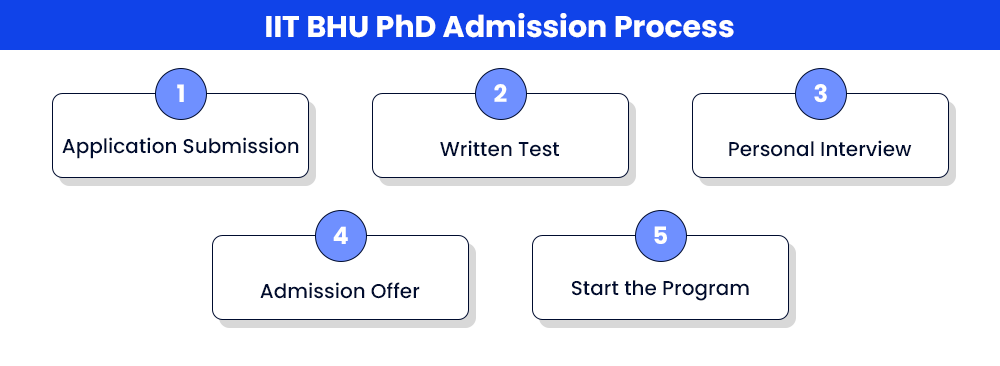
- Written Test- Once the application form for IIT PhD programs has been submitted, the admit cards for the written tests will be issued by the IIT BHU. Candidates applying for the regular full-time PhD(except candidates with National level Fellowship) are required to take the written test.
- Personal Interview- Once the written test is concluded, all the qualifying candidates are shortlisted and called for a personal interview. Candidates with national-level fellowships are also required to appear for the personal interview. The interview will be conducted by the Departmental Research Committee(DRC). Candidates need to prepare their research proposal in detail to appear for the interview.
- Admission Offer- After the successful completion of the personal interview, the admission committee of IIT BHU prepares a merit list based on the performance of the candidates. All the shortlisted candidates are given admission offers and they can secure their seats for PhD at IIT BHU by paying the admission fee.
- Start the Program- Start the IIT BHU PhD when the session starts.
Conclusion
In Conclusion, the Indian Institute of Technology, BHU(IIT BHU) is one of the best institutions for PhD admissions. The program is supported by cutting-edge research facilities and opportunities for independent research in a wide range of disciplines. The difficulty level of the PhD admissions at IIT BHU is a bit on the higher side with written examinations and personal interviews. Candidates planning for IIT BHU PhD admissions need rigorous preparation.

